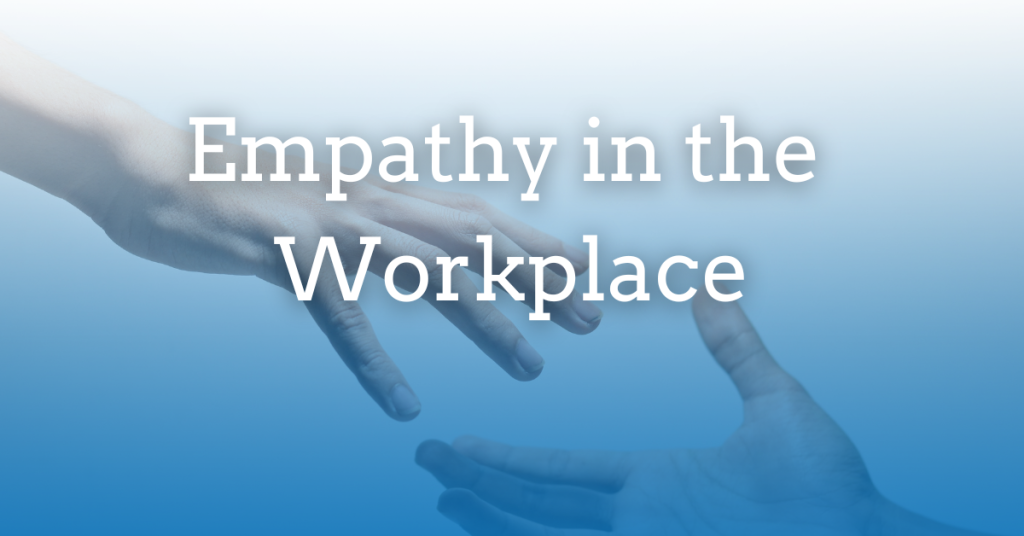The American workplace isn’t what it used to be, and the qualities attributed to strong leadership have evolved. While a strong and decisive personality can help you pave the way to move your organization forward, empathy and compassion are now just as important.
Team members want an empathetic leader who can be present throughout the work week and consistently treat every staff member with respect and dignity. In fact, Harvard Business Review found that leading with empathy and demonstrating support for your employees are among the most vital traits for a leader to have.
Why is empathy in the workplace important?
A recent study by Business Solver found that 68% of HR professionals view their CEO as empathetic, which is a decline from the previous year and the lowest level ever reported.
Empathy is your ability to understand someone else’s feelings. This skill allows you to relate to their thoughts and feelings and use that information to aid your response. Empathy enables you to respond to a team member kindly and compassionately.
It’s also important to note the difference between empathy and sympathy. While these terms are similar, they don’t deliver the same personal acknowledgment.
- Sympathy is having compassion or concern for another person’s hardship, but without necessarily fully understanding their emotions.
- Empathy is the ability to understand and share the thoughts, experiences, and feelings of someone else.
Empathy can be used to foster great relationships and thoughtfully relay the company’s care for its staff. Leaders who follow empathetic practices can:
Improve customer service
When your entire company knows the value of compassion and uses active listening skills daily, customer service with your clients can improve. Using empathy with the people you’re serving will help you anticipate what they need or desire, enabling you to refine how you provide them with solutions.
Enhance communication
Empathetic leaders can adapt their conversation style to the specific person or team they’re talking to. This is a way to show your teams you listen to them and know them well enough to understand the most effective communication approach. It also keeps things from getting lost in translation and avoids frustrating, ineffective conversations.
Boost creative thinking
When you know what the people around you need, you can better provide for them. This can result in enhanced creativity and problem-solving, ultimately driving more excitement about the work. When applying this action plan, employees may consider ideas that they haven’t before. They can use strategies that help accomplish business goals more effectively.
Strengthen trust
Validation can be a powerful tool. Team members who feel backed by their leaders may be more likely to bring forward concerns faster, encourage those around them, and work diligently to meet targets. Establishing a solid rapport and gaining trust with your employees can be aided by taking an empathetic approach.
How does empathetic leadership impact employees?
While empathy is an essential skill in the workplace, it’s often undervalued. Empathy can have a big impact on employees’ mental health, retention, and engagement.
Employee mental health
Mental health issues are prevalent in the workplace. According to the National Institute of Mental Health, about one in five adults live with mental illness. This statistic illustrates employees’ desire for company leadership’s support and encouragement throughout the work week.
When leaders prioritize empathy, they create a company culture that places mental health as a top-of-mind issue. This motivates team members to seek help when needed, reduces the stigma surrounding mental health, improves therapy outcomes, and increases access to helpful resources and support for everyone.
Employee retention
It’s expensive to replace trained employees with brand-new applicants. Marketing positions, interviewing candidates, and on-boarding new hires takes time and energy that could be spent accomplishing business tasks. But this can be avoided using empathetic leadership practices.
People tend to be more loyal to companies where they feel comfortable, trusted, and supported. Empathetic leadership promotes a more positive work environment where employees are cared for and stay for years. If you give people no reason to leave, then they won’t.
Employee engagement
One critical aspect of coaching, mentoring, and guiding employees is understanding what drives and motivates them.
Empathetic leaders give insightful feedback and lead their teams in the right direction with intuitive instruction. You can only do this if you know the right communication approach and the best way to interact with them.
We all require motivation in different forms. By having a compassionate and personal relationship with each of your staff members, you’ll be better positioned to prompt and inspire them to do the best work possible.
Demonstrating empathy in the workplace
People aren’t often naturally empathetic. It’s a learned trait that takes practice. While exercising empathy can be time-consuming and potentially taxing, refusing to improve this skill could hinder your business.
Here are some ways for you to cultivate a more compassionate company culture:
Don’t minimize people’s situations
People generally know themselves better than anyone else can. The same can be said about emotions and personal situations. Perhaps you’ve experienced a similar situation that your colleague is currently experiencing. That doesn’t mean you understand exactly how it’s affecting them. Everyone experiences problems and emotional stages differently. How you process information may differ from someone else.
Look at situations from another point of view
The goal of empathy is to see things from another person’s perspective. This enables you to better understand why they think the way they do, what drives them, and how best to serve them. To become more empathetic, practice placing yourself in someone else’s situation. Even if this individual is someone you disagree with, doing this can help you comprehend what drives them and why they may be coming to a different conclusion than you. Ask yourself, “What kind of experiences have they had that led to how they see the world?”
Use active listening skills
To have an empathetic understanding of your staff, it’s vital that you listen to them. Active listening requires more than eye contact and nodding your head to what they say. Active listening requires actively hearing what they’re communicating and focusing on them to reply with a thoughtful response. Don’t use the time someone is speaking to formulate your own answer. You can only give a genuine remark after listening to all they say. Consider how you’d like someone to listen and respond to you. Then, do the same for others.
Be open to feedback
A big part of being a great leader is hearing from your employees. Asking for feedback is a sign of a well-rounded and thoughtful manager. But it’s not enough just to listen to feedback. While people desire to be heard, they often also want action. Reflect on feedback from your team and see what can be done from a leadership perspective.
Benefits of an emotionally intelligent workforce
While empathetic leadership helps lead staff members by example, they’re not the only ones responsible for creating a kind and understanding workplace culture. An emotionally intelligent workforce leads to better teamwork, greater self-awareness, and increased self-control.
- Emotional intelligence: The ability to understand and manage your own emotions to recognize and influence the feelings and emotions of the people around you.
To acknowledge others’ emotions, you must first identify and manage your own. Being emotionally intelligent makes self-awareness a priority. Practice self-awareness by acknowledging your feelings and determining how to manage those emotions to better serve your company and coworkers.
An emotionally intelligent workplace breeds trust and respect amongst employees. To improve your company’s emotional intelligence:
- Identify where you struggle: Before learning emotional intelligence, you must first understand your limitations when communicating your feelings or understanding the emotions of others.
- Look at past interactions: If you’re currently experiencing a difficult situation and are responding poorly, it can be beneficial to look at the past and see how you’ve dealt with this type of problem before. Think of interactions where you could have responded to someone with more empathy.
- Get feedback: Whether it’s an employee going to a superior or a manager approaching their team, getting feedback is helpful. Though uncomfortable at times, asking for your team’s thoughts on your level of empathy can be a good practice to further your emotional intelligence.
Employees desire to work for companies that care for them and provide what they need to succeed. Empathy goes beyond personal needs—it also requires you to pay attention to the overall well-being of your staff.
Thank you to our friends at Marsh McLennan Agency for providing this information. Marsh McLennan Agency is a Service Provider with the Conway Center, offering employee health and benefits.

Visit our Service Provider Directory to learn more.

